What Are En Suite Bedrooms or Bathrooms? Pros, Cons, & FAQ
-
Pete Ortiz
- Last updated:
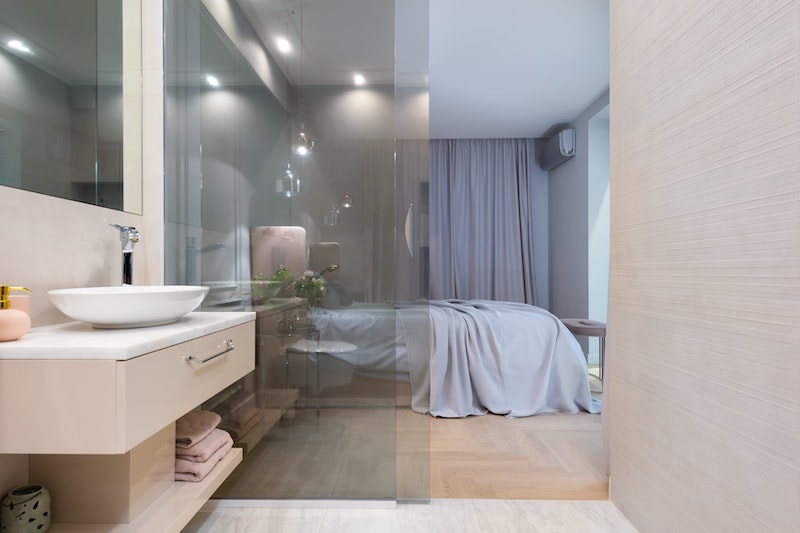
Have you ever come across the word en suite bedroom or bathroom and wondered what it means? This word is often used in real estate when listing properties for sale or rent. Some hotels also use it to describe their rooms.
Whether a bedroom or bathroom is en suite or not can determine the value, accessibility, and suitability of a house, so it’s important to know what it means.
The word en suite means connected to. When used in real estate, it refers to a room directly connected to another room through a door. You can only access an en suite room through the connected room, not from a hallway or other common space.
Understanding what en suite bathrooms and bedrooms are will help you choose the best house for you or your family. Read on to find out exactly what en suite bathrooms and bedrooms are, the different types, and their advantages and disadvantages.
How Do En Suite Bedrooms or Bathrooms Work?
An en suite bathroom is directly connected to a room, often a bedroom. It might be connected to other rooms, such as an office, in some settings.
An en suite bedroom is directly connected to a bathroom. These terms en suite bathroom or en suite bedroom can be used interchangeably to mean a bedroom with direct access to a bathroom.
Note that this doesn’t apply to a bathroom directly connected to two bedrooms. This type is referred to as a “Jack and Jill bathroom” and isn’t considered an en suite.
When you have an en suite bedroom, you don’t have to leave the room to use the bathroom facilities. This differs from a shared bathroom, which is often accessed through hallways and used by people using other bedrooms.
In private residences, most en suite bathrooms are found in master bedrooms. The master bedroom is bigger than the other bedrooms in the house. More luxurious homes may have two en suite bathrooms, with the other connected to a guest room.
En suite bedrooms are a standard feature in hotels, so they are not out of the ordinary. But in private homes, they are considered a practical luxury in houses with multiple bedrooms.
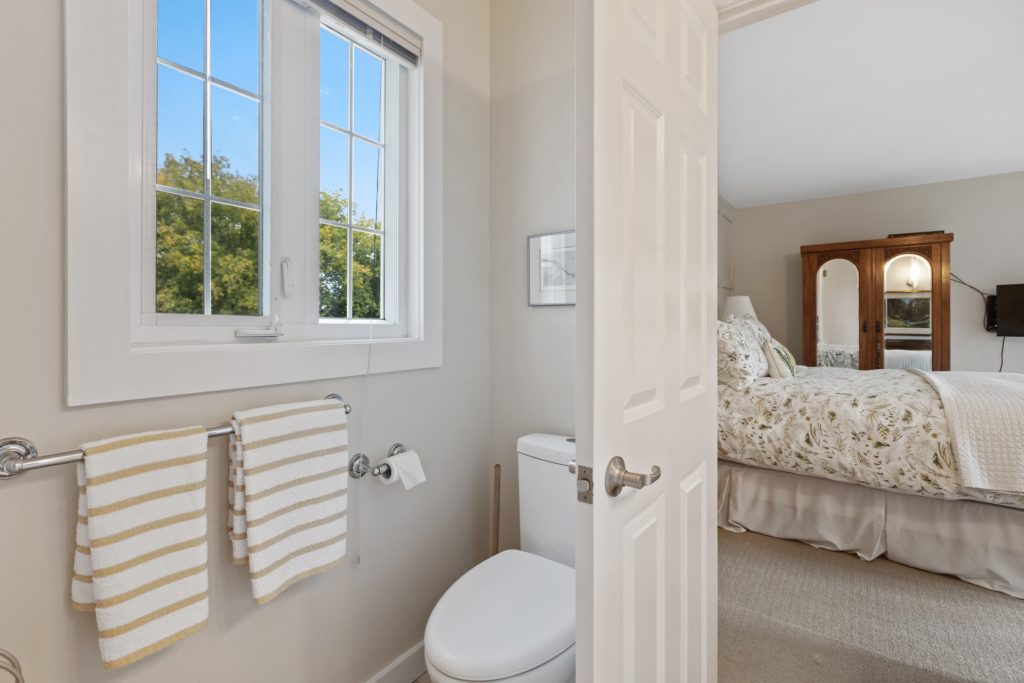
What Are the Different Types of En Suite Bedrooms/Bathrooms?
There are three different types of en suite bathrooms: full, three-quarter, and half. The types are differentiated by the number of facilities present between a shower, tub, sink, and toilet.
A full bathroom has all four components: a toilet, shower, tub, and sink. Master bedrooms often include a full en suite bathroom. In hotels, this type is often found in higher-priced rooms.
The tub and shower in a full bathroom may be combined or separated. Combined, they often use the same controls, with a lower faucet serving the tub and a higher showerhead for showers. Separate tubs and showers take up more space since there’s a different shower cubicle.
Three-quarter en suite bathrooms contain three components: a sink and toilet with a tub or shower. Most modern three-quarter en suites have a shower instead of a tub.
Property listings may refer to a three-quarter bathroom as a 0.75 bathroom. Standard-priced hotel rooms often have 0.75 en suite bathrooms with a shower.
Half bathrooms have two components, often a toilet and a sink. This type is suitable for use by day guests who don’t need a shower. A half-bathroom is also referred to as a powder room and can be listed as a 0.5 bathroom.
Where Are En Suite Bathrooms and Bedrooms Used?
En suite bedrooms can be found in different accommodations, from private residences to hotels and cruise ships.
Full and three-quarter en suite bathrooms are the most common in all settings. Half bathrooms are not practical in hotel rooms since you cannot shower in them. They are also rare in private homes since they could be considered a waste of space.
You’re likely to find a half bathroom in luxurious residences where they can afford the space to provide extra convenience to guests. It’s also a suitable addition to a home office.
In homes with two en suite bathrooms, one is often a full bathroom, while the other is a three-quarter bathroom. 0.75 bathrooms are suitable for guest rooms, while you’ll find full bathrooms in the master bedroom.
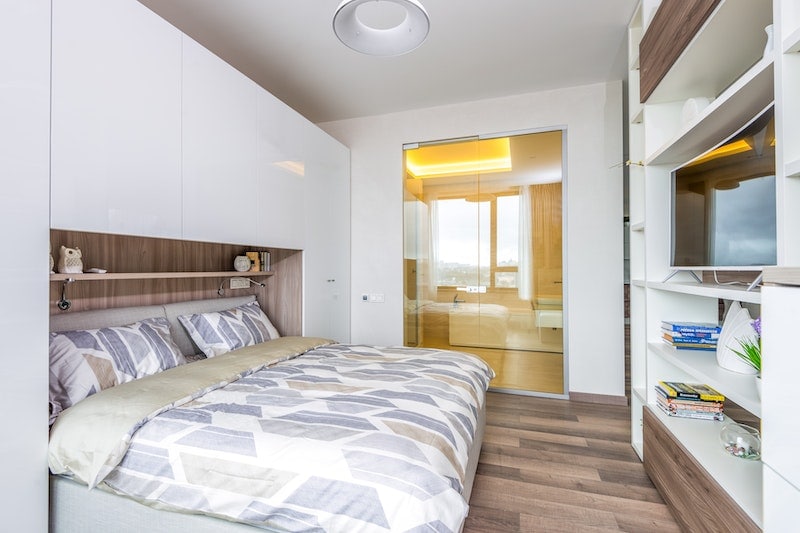
Advantages of En Suite Bedrooms and Bathrooms
En suite bedrooms and bathrooms have several advantages, including the following:
1. Privacy
An en suite bathroom is your personal space, maybe only shared with your partner. You don’t have to worry about keeping your hygiene products, medicine, or linen away from kids or guests.
2. Convenience and Safety
A bathroom connected to your bedroom is more convenient and safe than one outside the room. With an en suite bedroom, you don’t have to stumble through the dark or, worse, down the stairs at night to use a bathroom. This is even more important for older or sick people.
3. Increased Home Appeal and Value
An en suite bathroom will add to your home’s appeal and value when reselling or renting space in your home. Let’s say you are renting a room in your house. Your guest will feel more comfortable if they have private access to a bathroom.
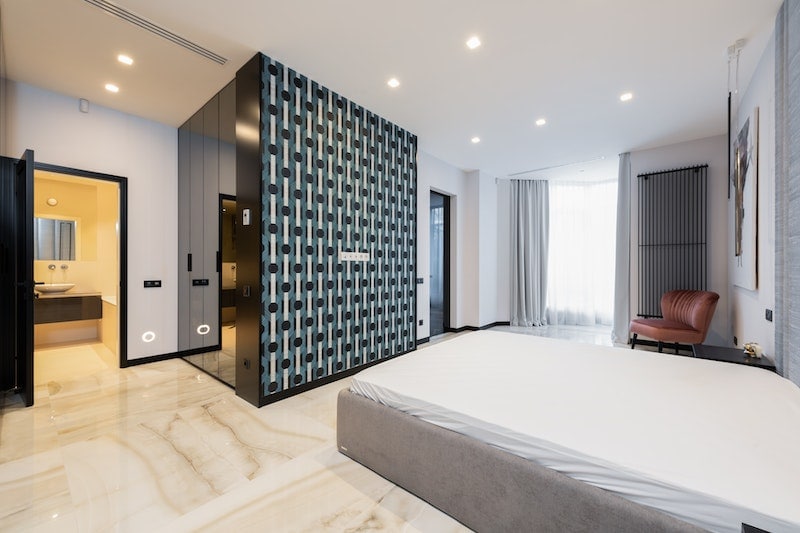
Disadvantages of En Suite Bathrooms and Bedrooms
En suite bedrooms can also be disadvantageous in certain cases. Here are two disadvantages you should know about.
1. They Take Up Space
Ensuite bathrooms take up space in the room, leaving your bedroom smaller. This is especially a concern when having a bathroom remodeled into your bedroom. Shared bathrooms are more space-economic, but if you have enough space in your room, this shouldn’t be a concern.
2. Lack of Privacy in One-Bedroom Homes
If you have an en suite bathroom in a one-bedroom apartment, this affects your privacy when guests have to use it. They must go through your bedroom to use the bathroom, exposing your most private space to them. Selling such an apartment may also prove difficult because of this inconvenience.
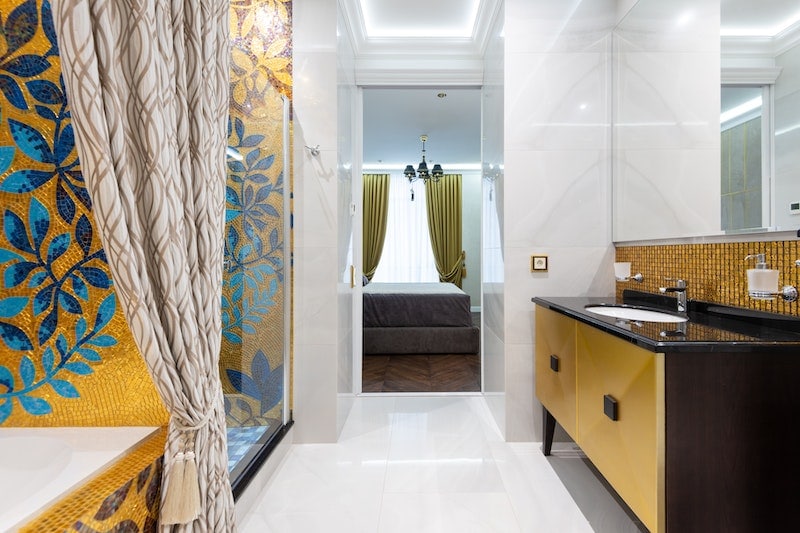
Frequently Asked Questions
The following are some frequently asked questions about en suite bedrooms and bathrooms.
What Is the Difference Between an En Suite and a Master Bedroom?
An en suite bedroom is connected to a bathroom, while a master bedroom refers to the largest bedroom in the house.
The master bedroom is often the one with an en suite bathroom in a home, but it’s not a mandatory feature. On the other hand, an en suite bathroom can be part of any bedroom.
Is an En Suite Bathroom the Same as a Private Bathroom?
No, an en suite bathroom is not the same as a private bathroom. While an en suite is connected to a room, a private bathroom is not. The latter is also for private use, but it’s found outside the bedroom.
Should I Get an En Suite Bedroom?
To know whether to get an en suite bedroom or not, consider the pros and cons. If you’re interested in having a private space where you’re never in a rush because someone else wants to use the bathroom, go for it. But, if you live in a small one-bathroom home, keep in mind the privacy concerns when someone else has to use it.
Final Thoughts
En suite bedrooms and bathrooms are a great addition to a home. They offer privacy and convenience and increase your home’s resale value.
Having an en suite master bedroom is a great idea for parents. It gives you and your spouse a private space away from the children. You also don’t have to waste time queuing up with your kids for the shared bathroom in the morning.
Of course, en suites are not for everyone; in small houses, they might be an unnecessary luxury that occupies crucial space and limits privacy.
Featured Image Credit: max-vakhtbovych, Pexels
Contents



